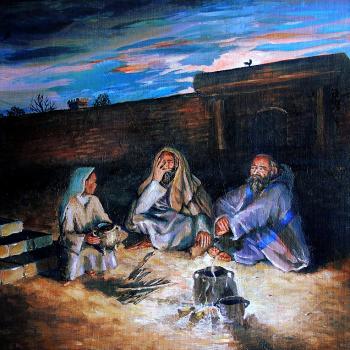This is second post where I answer a reader’s questions about my latest article, “We Compromise the Gospel When We Settle for Truth: How ‘Right’ Interpretation Lead to ‘Wrong’ Contextualization.”
Comment from John:
Absolute moralism/relativism—this is a little difficult to swallow. I understand and agree with much of what you say hear. From a Chinese perspective, they fear in making moral judgments even within contexts that demand one. For example, abortion. Is this right or wrong? Pirating software or DVDs? I know the latter is silly, but it is an issue here. You can also see the laziness, lack of passion and simple irresponsibility concerning male leadership in families and churches in China (obviously, this is not particular to China).
JW:
Do not overlook the larger point of the essay––worldview affects our perspective and thus what we see when we read Scripture. Notice I did not say “truth.” Truth is truth regardless of any culture. However, what I notice may change due to my position in life, etc. Because Bible-loving believers rightly are concerned with absolute truth, there is an overreaction against difference in emphasis (which emerge from differing perspectives). When it comes to interpretation, evangelicals can be quite intolerant and fearful of anything that is not traditional. The line that runs through my head again and again is “What if . . . . What would this lead to?” For example, in the “What is the gospel?” debates (e.g. Scot McKnight’s book The King Jesus Gospel), I have never once seen an evangelical challenge McKnight’s exegesis. Instead, they simply misrepresent him as making false dichotomies or else just say, “What if . . . ?” To address the moral issues you mention, one needs to be a good exegete and have wisdom. This practically will mean a person must know the limits of their argument and so is able to measure the strength by which he holds a position. One needs to appreciate nuance in order not to be dogmatic when something is really debatable. In this way, we can figure out if the “infraction” holds for all perspectives (universal/absolute) or is contingent on certain factors. That sort of analysis is not straightforward and often requires patience–––most missionaries (and Christians) I know don’t have that appreciation for subtlety, lack humility, and/or don’t have breadth of familiarity with the respective issues.
Comment from John:
Here you mention sin, 罪. What would you suggest here during a presentation of the Gospel or teaching in general? What about the emphases on idol worship and the heart? Isn’t this the root of sin? The idea of preferring something other than God, i.e. self, money, or whatever we substitute for Him. Also, what about the idea of substitution? Is this is a place where both legal righteousness and honor/shame intersect?
JW:
Concerning “sin,” I don’t especially like the word 罪, because it narrows the meaning of the human problem to one isolated metaphor. It would be ok if we were very clear that we are talking in reference to a king, not merely a courtroom judge. Since we don’t do this very well, a better and safer way is 过犯. People will all admit they commit guofan. At this point, we illustrate the nature of sin with honor-shame language. I frequently describe sin as “publicly spitting in your Father’s face.” I’ve never had someone misunderstand that imagery. Idol worship is just one imagery for talking about the thing that people honor above all else. It’s no coincidence that Isaiah and other prophets interlaced passages about idolatry with honor-shame language. As far as substitution goes, you’ll have to see the dissertation for details. In short, honor-shame societies are collectivistic, which means groups share in each other’s honor-shame status. The group head represents the whole such that if he is shamed or honored, then so also is the group. Traditional theology uses terms like “federal headship” to refer to a dynamic that is just common sense to an Easterner. Of course, what is true for my father (in a family) or president (for a country) is reckoned to me. If the Prime Minister of some country spit on the face of China’s president, the nation would be enraged for disgracing China. If my father’s name were someone famous, like Steven Spielberg or Bill Gates, guess what? People would treat me different. for no other reason than this, a lot of people would be kind to me and honor me as they wouldn’t any other person who crosses their face.
Comment from John:
Linear/Cyclical History—I like the presentation you made here. This is true and helpful when we understand these aspects. Here, I would caution of what aspect we can accept and reject from both sides. For example, Buddhism has influenced Chinese culture as has Confucius, so deeply. Reincarnation is anti biblical, right? And not only in the new creation do we see a breaking of this endless cycle of sin, but now in the new Adam, Christ when he died and gave us new life. Can you explain the spiral or cone idea of thinking? This seems extremely helpful.
JW:
Yes, reincarnation is wrong. I’m not sure, but I wonder if your reply about Christ indicates that you mistook the answer I gave in the essay. Perhaps, you were just adding to it? New creation includes us (2 Cor 5:17; Gal 6:15; cf. Rom 8 ). Christ breaks the cycle of sin and death, however this happens in stages within history. For example, his ultimate victory over death has not yet been actualized in all creation (cf. 1 Cor 15:24–28). Death has not yet died (cf. Rev 20:14). So, when the new heaven and new earth are established, the cycle will have ended completely. The spiral/cone, by adding a third dimension, idea seeks simply to illustrate that even cycles can have direction or purpose. So, the word “cycle” does not need to imply absurdity.












